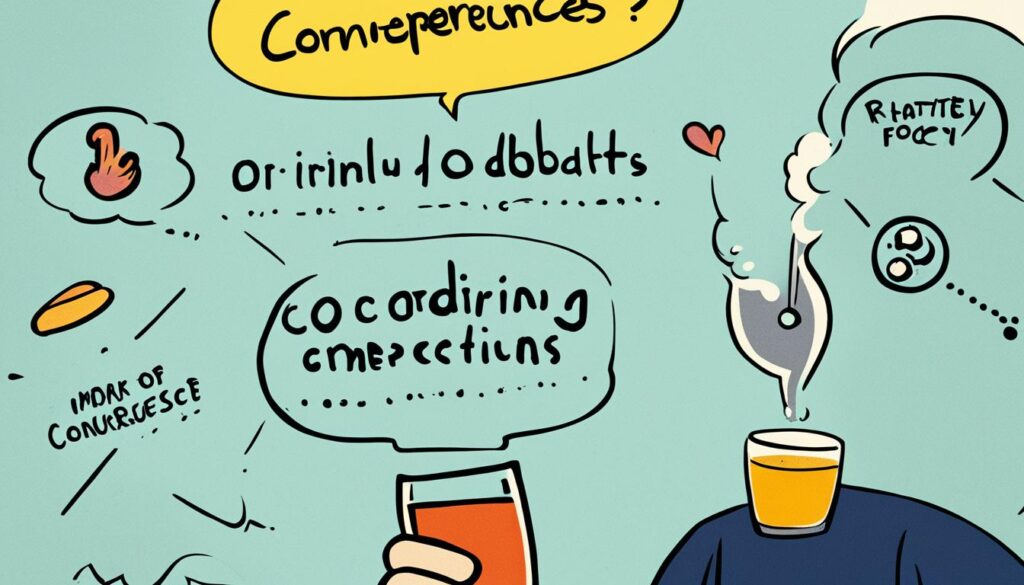Alcoholism touches millions of people from all walks of life. It’s vital to know how to help those close to us. This guide shares ways to support someone struggling with alcoholism. By understanding alcoholism, spotting its signs, and knowing how to step in, we can help a lot. These steps can make a big difference in someone’s recovery.
Learning about alcoholism helps us offer the right kind of support. Spotting signs of alcohol use disorder lets us act at the right time. With the right approach, we can create a supportive space for recovery.
Key Takeaways
- Understanding alcoholism is crucial for effective assistance.
- Recognizing the signs of alcohol use disorder can inform intervention strategies.
- It is possible to support a loved one throughout their recovery journey.
- Relapse prevention is an ongoing process that requires proactive measures.
- Engaging in mutual-support groups can complement treatment efforts.
- Compassionate intervention techniques can lead to positive outcomes.
Understanding Alcoholism
Understanding alcoholism is key to tackling its complex issues. It’s a major public health problem, hitting millions of people and their families hard. The National Institute on Alcohol Abuse and Alcoholism says about 6.2% of adults in the U.S. struggle with it.
This condition makes people drink compulsively, even when it harms them. It leads to a strong need for alcohol, both physically and mentally.
Young people are also affected by alcoholism. One in five teens and young adults drink alcohol now. This shows why teaching kids about drinking safely is vital.
Alcohol use disorder can be severe. In young adults, about two in five binge drink, and one in ten are heavy drinkers. Knowing these facts helps us find better ways to help them.
Helping people with alcohol use disorder is crucial. Therapy like cognitive-behavioral therapy helps 58% of patients get better. Motivational therapy also cuts down on how much alcohol young people drink after going to the emergency room.
Groups like Alcoholics Anonymous offer support for recovery. Residential programs combine therapy, family support, and activities for a full recovery plan. Medicines like disulfiram and naltrexone help manage dependence, showing we need a broad approach to treatment.
Alcoholism often goes hand in hand with mental health issues. Many people with AUD also have other mental health problems. This means treatment must cover both alcohol use and mental health, highlighting the need for more research and awareness.
Signs of Alcohol Use Disorder
It’s crucial to spot the signs of alcohol use disorder (AUD) early for help. In 2021, about 28.8 million adults aged 18 and older had AUD, says the 2022 National Survey on Drug Use and Health. Also, 753,000 teens aged 12 to 17 were struggling with it. This shows why it’s key to catch alcohol problems early.
To see if someone has alcohol misuse, look for the signs listed in the DSM-5. These signs include:
- Failed attempts to cut down on drinking.
- Using alcohol despite experiencing negative consequences.
- Experiencing withdrawal symptoms when not consuming alcohol.
The severity of AUD depends on how many criteria are met:
| Severity Level | Criteria Met |
|---|---|
| Mild | 2–3 criteria |
| Moderate | 4–5 criteria |
| Severe | 6 or more criteria |
Spotting these signs helps with treatment and raises awareness of alcohol’s health risks. Drinking too much alcohol is linked to over 60 diseases and is a top cause of preventable death in the U.S. Knowing these signs and acting fast can greatly improve someone’s life and health.
Effective Strategies for Helping an Alcoholic
Helping someone with addiction, like alcohol use disorder, needs careful thought and compassion. An alcohol use disorder can get worse, making early help crucial for recovery. Here are some ways to help a loved one on this tough journey:
- Initiate Conversations: Talking about alcohol use can be hard. Be gentle and listen well to their feelings.
- Seek Professional Assistance: If they don’t want help, think about getting a professional to help talk to them.
- Avoid Enabling Behaviors: Help them get treatment but don’t cover up the problems they cause. Don’t take over their tasks.
- Join Support Groups: Groups like Alcoholics Anonymous or Al-Anon offer great support for both the person and their family.
- Practice Patience: Recovery takes time and may have ups and downs. Stay supportive and keep encouraging them.
- Prioritize Self-Care: Helping someone with alcohol issues can be hard on you too. Make sure to take care of yourself.
Understanding alcohol addiction’s complexity is key to helping effectively. Helping someone with alcohol issues affects families and friends a lot. By being compassionate and supporting professional help, you can help your loved one recover.
| Strategy | Description |
|---|---|
| Initiate Conversations | Approach the topic with sensitivity to express concern. |
| Seek Professional Help | Involve experts when the individual resists help. |
| Avoid Enabling | Do not financially support behaviors that hinder recovery. |
| Join Support Groups | Engage with groups that offer shared experiences and support. |
| Practice Patience | Recognize that recovery can involve setbacks and requires time. |
| Prioritize Self-Care | Take care of personal well-being while supporting the individual. |
Recognizing When It’s Time for Treatment
It’s crucial to know when someone needs help with alcoholism. Early signs include ongoing health problems, personal conflicts, financial issues, and cognitive issues. These signs show it’s time to act.
Knowing the right time to help someone with their addiction is key. Studies show people with substance abuse issues often live shorter lives. This highlights the need for quick action. Also, alcoholics often end up with more debt, which worsens mental health and relationships.
Planning an intervention takes weeks. Pick a time when the person is unlikely to be drunk. A good intervention team has 4 to 6 people chosen carefully. It’s important to have one person in charge for updates and communication.
Rehearsals help make the intervention go smoothly. Everyone knows their part and when to speak. This makes the meeting more effective.
When looking into treatment, consider places like Mayo Clinic and Alpha 180 IOP in Austin. They offer various programs. These include holistic healing, group sessions, and one-on-one counseling. They aim for lasting recovery.

How to Identify an Alcohol Problem
Identifying alcohol problems can be tough but very important. Knowing the signs of alcoholism helps people check how they relate to alcohol and act. The Dietary Guidelines for Americans say moderate drinking is two drinks or less per day for men and one drink or less for women. Drinking more than this often means there might be a problem.
To start an alcohol assessment, think about these questions:
- Do you find yourself drinking more than you planned?
- Have you ever felt withdrawal symptoms when you weren’t drinking?
- Do you drink alcohol in dangerous situations?
- Have your loved ones worried about your drinking habits?
Physical signs like bloodshot eyes and an unsteady walk can show signs of alcoholism. Changes in behavior, like mood swings or sudden irritability, also point to a possible alcohol use disorder (AUD). If someone can’t control their alcohol use, even if it harms their life, they might have an AUD.
Spotting these signs early helps with getting help on time. In 2022, about 29.5 million Americans aged 12 and older had an AUD. With the right support and treatment options, people might be more likely to seek help. The recovery process gets better with the support of friends and family. Being proactive about spotting alcohol problems and knowing the risks of early drinking can lead to better results for those affected.
Preparing for a Difficult Conversation
Talking about alcohol problems can be tough. It’s important to be careful, empathetic, and understanding. Getting ready for the conversation can really make a difference. Use supportive words to show you care about the person’s health.
Practicing Your Approach
Begin by thinking of your words in terms of “I.” Instead of saying “You drink too much,” say “I’m worried about your health because I care about you.” This makes you sound more confident and keeps the conversation positive. Talk about the good things that can happen if they cut down or stop drinking. Show them it’s possible and worth it.
Choosing the Right Time and Place
Picking the right time to talk is key. Try to find a moment when the person is sober and calm. This helps them open up more. Make sure to plan to talk again later to check on their progress and talk about goals. If they need help, suggest getting professional advice together.
| Elements of a Successful Conversation | Key Considerations |
|---|---|
| Non-accusatory Language | Use “I” statements to express feelings and concerns. |
| Timing | Choose a sober, calm environment for discussion. |
| Supportive Approach | Encourage the discussion of goals and possible changes. |
| Encourage Professional Help | Explore treatment options together for a collaborative effort. |
| Follow-Up | Schedule regular conversations to monitor progress. |
Talking about alcohol problems is key to helping a loved one make better choices. About 15.1 million adults in the U.S. deal with Alcohol Use Disorder. Being prepared can lead to effective help and support. For more on mental health and alcohol, check out this resource.
Compassionate Intervention Techniques
Facing alcoholism is tough for the person and their loved ones. Using kind intervention methods can help with healing. These methods focus on supporting the person and starting open talks instead of fights.
Planning an intervention means bringing together people who want to help the person with alcohol issues. This shows the person they’re not facing this alone. It’s important to show real concern, which can make the person more open to help.
Family and relationships are key in making a safe space for an alcoholism intervention. In many cases, experts like counselors help with these interventions. They guide the talk and make sure it stays helpful. Their help can reduce fear and make the person feel safe to share their feelings.
Key parts of kind intervention include:
- Creating a place where no one judges
- Telling the person how their actions affect others
- Discussing professional help options
- Offering support all through the recovery process
By using these kind methods, families can start important talks. These talks can help people feel hopeful and ready to get help. The right words can lead to hope, understanding, and recovery.
| Compassionate Techniques | Description |
|---|---|
| Empathy | Understanding the struggles of those with alcohol use disorder. |
| Active Listening | Listening to the person’s feelings and thoughts during talks. |
| Positive Reinforcement | Noticing and celebrating small wins to boost confidence. |
| Crisis Planning | Getting ready for strategies when the person faces big challenges. |
| Follow-up Support | Keeping in touch to help with ongoing recovery. |
Strategies for Supporting a Loved One with Addiction
Supporting someone with addiction means understanding their struggles and the recovery process. It’s key to offer continuous support for healing. This journey is tough, but knowing how to help can really make a difference.
Offering Continuous Support
Being there for your loved one is crucial in their recovery, especially when they’re dealing with alcoholism. Being emotionally supportive helps them through tough times. Studies show that catching substance use early can lead to better recovery outcomes.
So, it’s important to support your loved one from the start. Talking openly about their substance use can help them see the need for help. This can motivate them to seek treatment.
Understanding Their Struggle
It’s important to understand the emotional and physical challenges your loved one faces. Partners often deal with their own issues, like headaches and anxiety. Being empathetic is key to supporting them well.
Encouraging them to get professional help is crucial. It’s also important for you to seek help to stay emotionally strong. This way, you can support them better. For more insights, visit this informative resource.

| Risk Factors of Addiction | Consequences Without Intervention |
|---|---|
| Emotional instability | Arrests |
| Family dynamics issues | Medical emergencies |
| Increased anxiety levels | Job loss |
| Risk of future addiction | Public embarrassment |
| Educational challenges for children | Potential death |
By focusing on emotional support and understanding addiction, you can help your loved one recover. The journey is hard, but it leads to healing and stronger relationships.
Researching Treatment Options
It’s important to know the different ways to treat alcoholism for a good recovery. People with alcohol problems can get help from a mix of therapies, medicines, and support groups. Each one is chosen based on what the person needs.
Behavioral therapies like Cognitive Behavioral Therapy (CBT) change negative thought patterns that lead to drinking too much. Studies show that about 60% of people who try CBT stay sober for at least a year. Adding CBT to other programs or support groups like Alcoholics Anonymous can make recovery even stronger.
Medicines also help people with alcoholism. Disulfiram, Naltrexone, and Acamprosate are some of the medicines used. They are often given with behavioral therapies for a stronger treatment plan.
- Cognitive Behavioral Therapy (CBT): A structured approach that helps individuals manage triggers and cravings.
- Medications: Prescriptive solutions to support abstinence and decrease withdrawal symptoms.
- Mutual-Support Groups: Community-based support systems that encourage shared experiences and accountability.
Creating a treatment plan that fits the person is key to success. Things like the person’s history with alcohol, any mental health issues, and what they prefer are important. This way, the treatment plan works better for them.
Families can help find the right care by looking into local options and centers that focus on alcohol recovery. Being involved helps clear up the mystery of getting better and makes choosing treatment easier.
| Treatment Option | Description | Effectiveness |
|---|---|---|
| Cognitive Behavioral Therapy (CBT) | Psychotherapy that focuses on changing negative thought patterns. | 60% maintain recovery for one year. |
| Disulfiram | A medication that deters drinking by causing adverse reactions. | Effective for those motivated to quit. |
| Naltrexone | Reduces cravings and the pleasurable effects of alcohol. | Helpful for individuals seeking to reduce consumption. |
| Alcoholics Anonymous (AA) | A mutual-support group offering encouragement through shared experience. | Promotes accountability and community support. |
Looking into all the ways to treat alcoholism can help someone recover better. It tackles the addiction and any other issues at the same time.
Involvement in Mutual-Support Groups
Being part of mutual-support groups is key to recovering from alcoholism. These groups offer important peer support, which goes hand in hand with professional help. Studies show that groups like Alcoholics Anonymous (AA) create a sense of belonging and community. This is crucial for people facing similar issues.
With over 53,000 groups and about 1.2 million members, AA is a big deal in the U.S. Many groups exist for different beliefs and groups, making it easy for people to share their stories. This sharing is a big part of getting better.
Research shows that being in these groups helps people do better. For example, studies found that using AA alone led to more people staying sober than just formal treatment. This shows how powerful community support can be.
Groups offer various ways to help, like cognitive-behavioral therapy and motivational therapy. Being in these groups brings many benefits, like better control over drinking and lasting recovery from addiction.
| Mutual-Support Group | Unique Feature | Target Group |
|---|---|---|
| Alcoholics Anonymous (AA) | 12-step program | General population |
| SMART Recovery | Self-management techniques | Evidence-based approach |
| Women for Sobriety | Focus on women’s issues | Women in recovery |
| Secular Organizations for Sobriety | Non-religious support | Agnostics and atheists |
Being in mutual-support groups helps with recovery and builds a strong support network. This support is key to staying sober for the long haul.
Dealing with Denial and Resistance
Denial in alcoholism is a big hurdle for families and friends trying to help. It stops people from seeing how serious their drinking is. Knowing how denial works is key to addressing resistance and helping someone get better.
When trying to overcome denial, talk gently and with kindness. This can prevent the person from getting defensive. Using ‘I’ statements instead of blaming can make talking more honest. For instance, saying “I worry when I see you drink a lot” works better than “You drink too much.”
People often resist help because they’re scared and ashamed of their drinking. They might compare themselves to others or blame things outside themselves. Sharing facts about the dangers of drinking can help clear up wrong ideas.
Studies show that people at different stages of change have different levels of wanting to get help. Doctors now try to help early on with programs for those who don’t want help yet. They look at what people think, plan to do, and how they make decisions to make their help better.
Denial not only makes recovery hard for the person but also hurts relationships and keeps the cycle of drinking going. Family and friends need to be careful and supportive. Getting help from professionals like counselors can make these tough talks easier.
When families and friends work together to help their loved ones, understanding denial and motivation can make recovery easier. For more info on panic attacks and how to deal with them, check out this resource.
How to Support Someone During Rehab and Recovery
Supporting a loved one through rehab and recovery is key. Recovery from alcohol use disorder doesn’t end with treatment. It needs ongoing support and understanding. Challenges can lead to relapse, so continuous support is crucial.
Participating in Aftercare Programs
Aftercare programs are vital for staying sober and avoiding relapse after rehab. They offer group therapy, counseling, and support groups. These help people deal with recovery’s challenges. By joining these programs, family and friends can help keep the recovery going.
Relapse rates are high, with 40-60% of people in treatment relapsing. Relapses often come from life issues like family problems, stress, and anxiety. Knowing this can help us support our loved ones better.
Encouraging healthy coping and celebrating small wins can help. It’s key to look after ourselves while supporting our loved ones. Family members can find help designed for those dealing with a loved one’s addiction.
For more on emotional and mental health in recovery, there are resources available. They talk about making smart health choices, like safely managing antidepressants. You can learn more about it here.

Preventing Relapse: Tips for Long-term Support
Preventing relapse is key to keeping support for recovery strong. People recovering from alcohol addiction face many challenges. It often takes several tries to stay sober, with some needing up to six attempts.
Identifying personal triggers is a big part of preventing relapse. Staying away from people, places, and situations that trigger cravings helps a lot. Having a strong support network is also crucial. This can include family, friends, and professionals who offer encouragement.
Good self-care is vital for staying sober. This means eating well, exercising, and getting enough sleep. Doing things you enjoy, like helping in the community, boosts your self-esteem and keeps you focused on recovery. But, it’s important to know that coming back to using can be risky, especially if you haven’t used in a while.
Getting ongoing mental health support is important. This can include things like therapy and motivational talks. Learning how to deal with cravings and negative thoughts is key. New methods like monitoring and peer support also help prevent relapse.
Talking openly about your progress and struggles is crucial. It helps keep you committed to staying sober. Understanding that recovery takes time, often two to three years, can lead to lasting growth.
Even though many people relapse within the first few months after treatment, the right strategies can help. Having access to counseling and support makes it easier to stay on track. For more info on depression, check out this resource.
Conclusion
Supporting a loved one with alcoholism shows us how key compassion and action are. This article talked about how important it is to understand and support those showing early signs of alcohol use disorder. By having caring talks and ongoing support, we can help people on their path to recovery.
It’s clear that staying with someone in recovery is vital, not just during treatment but also after. Connecting them with special care and groups like Alcoholics Anonymous helps a lot. Using proven methods and making sure they have the right resources can greatly help their recovery.
We should always approach our loved ones with kindness and deep understanding. This lets us give them the support they need to beat their alcohol issues. By working together, we can build a caring space that focuses on healing and long-term recovery.


